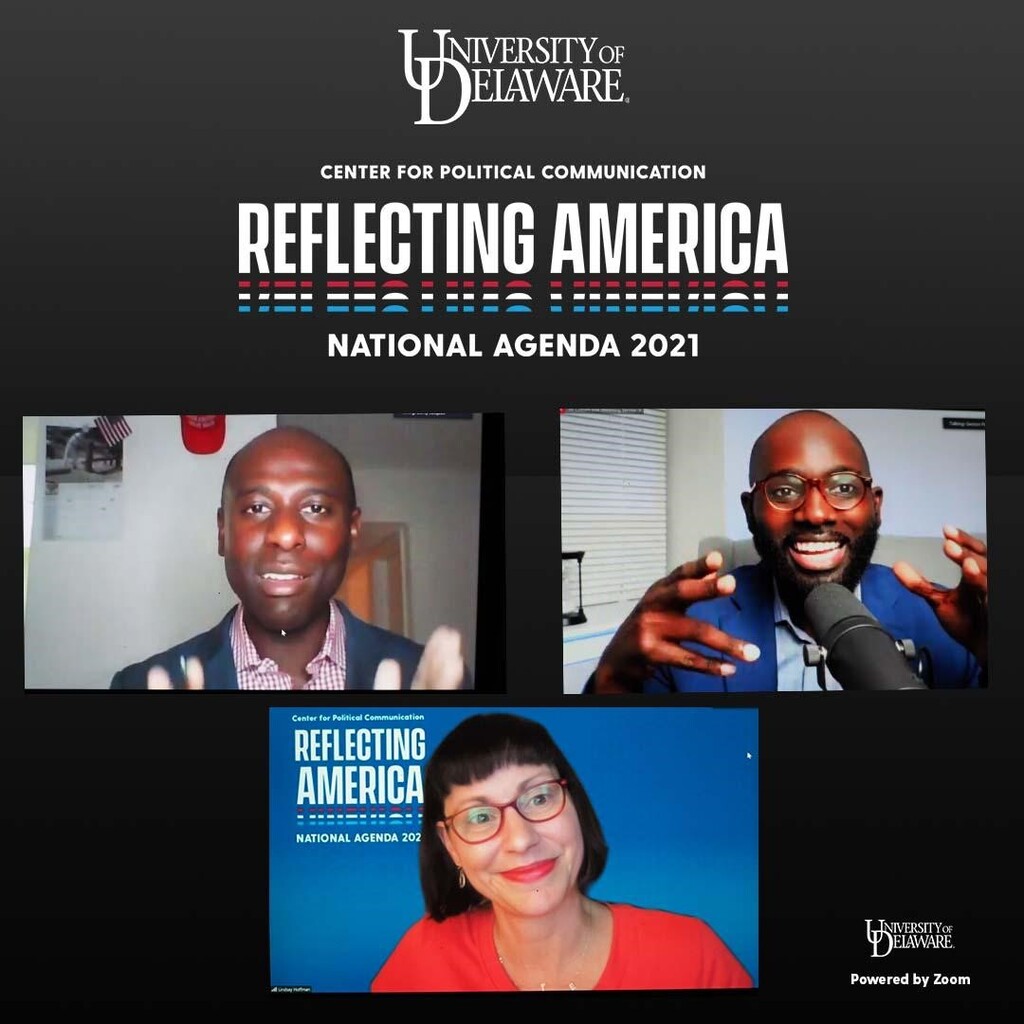Bromance or Enemyship?
Childhood friends remain close despite differences in political opinion
By Nicole Travis, University of Delaware Senior and intern for the University of Delaware’s Center for Political Communication
Watch the video. Read the transcript.
NEWARK, Del. – “Be comfortable with who you are and own it confidently. It is not a sign of weakness to listen to other people’s viewpoints,” said Geston Pierre on September 22, when he joined the second event of the University of Delaware’s National Agenda 2021 speaker series.
Hosted by the Center for Political Communication, the virtual program drew viewers from 10 states – including Florida, Massachusetts, and Missouri. Pierre, alongside childhood best friend Berny Jacques, offered practical tips on how to discuss divisive issues through civil dialogue. They navigated contentious issues that characterize the “divided states of America,” such as critical race theory, to illustrate how to understand opposing viewpoints instead of punishing them.
The friends first met when Jacques moved to Florida from Haiti at 7 years old. They found a common bond in their identities as children of Haitian immigrants. Pierre grew up to be an emerging leader, pastor, and musician, while Jacques is now a Republican politician and conservative activist. Despite the differences, they value the friendship, which Pierre described as a “bromance despite our political frenemy-ship.”

National Agenda Director Lindsay Hoffman, Ph.D., asked Pierre and Jacques to explain their stances on the controversial topic of critical race theory. Jacques said that critical race theory doesn’t belong in kindergarten through 12th grade. “It’s a curriculum that teaches people to hate each other. Teachers teach students to hate each other, to hate their country. Quite frankly, it creates animosity, it creates resentment.” He also said that it has a severe impact on true education because adding critical race theory to the curriculum shapes historical facts and events to fit ideological viewpoints.
On the other hand, Pierre stated that critical race theory is a tool of understanding, and without open dialogue, people remain divided and unequal. “I don’t believe that CRT is attacking a certain group or attacking Caucasians or attacking certain people. It is literally bringing to light the systems that make up the framework of our country,” said Pierre. “Until we are at a place where we are ready to talk about it openly, and to have that dialogue and to confess our sins if I might say as a country, we won’t be able to really be unified as a people. Because the reality is if we keep acting like nothing’s wrong, and we’re living in a post-racial America, we’re deceived in an illusion of inclusion.”
However, these opposing opinions were not the event’s main focus. The debate kick-started a very relevant discussion about how not to let opposing views end relationships.
So how do the friends talk about issues such as critical race theory and remain civil? They listen – not to respond to one another, but to understand their reasons. Most importantly, they don’t enter conversations expecting to be able to change minds. Instead, they allow room to at least comprehend each other. “There can be no constructive discussion, there can be no productive dialogue if you’re unwilling to sit and listen, even when it’s uncomfortable, even when you don’t like what you hear,” said Pierre. “You need to learn how to be comfortable with being uncomfortable.” When all else fails, they draw from their commonalities which ties back into their Haitian heritage.
Pierre and Jacques emphasized the importance of continued growth and openness to new ideas. “The moment that you believe that you have arrived, the moment that you stop growing, you start dying. And so I think that it’s important for us to continue to evolve as people, as students, as people living in this country,” said Pierre. “A growth mindset is a mindset that is embracing of discomfort, embracing of challenges, because every opposition is an opportunity to be better, to rise to the occasion.”
“I am a big believer in this idea of the marketplace of ideas, public square, where all can come and discuss their views without intimidation or without cancellation,” said Jacques. “We can have competing ideas and that’s what’s healthy in a republic like ours, and people can take it or leave it, but I think all sorts of viewpoints should be heard.”
About National Agenda
The National Agenda Speaker Series continues throughout the semester with guests such as Parkland survivor David Hogg, Delaware State Senator Sarah Mcbride, and artist and author Nikkolas Smith. Find more information and register.
Lindsay Hoffman, Ph.D., an associate professor of communication and political science at UD, directs the series. This year’s theme, “Reflecting America,” examines how this historic era of political divides, social movements, and economic upheavals”fueled by the pandemic and politics”is redefining America. National Agenda is free and open to the public. It is made possible with support from the University of Delaware’s Office of the Provost and the College of Arts and Sciences.
